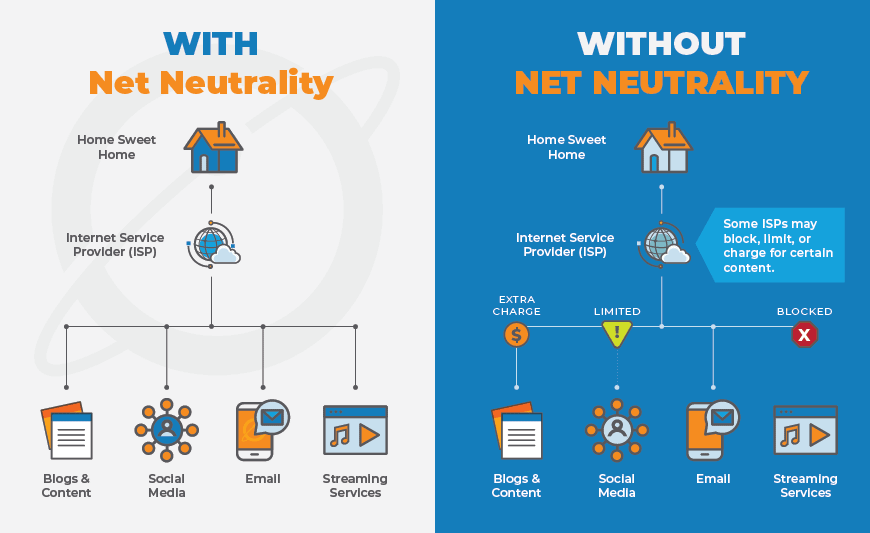The FCC is poised to repeal the repeal of Obama-era net neutrality rules, and this a good thing for sports fans
Internet access should be regulated as a utility
Nearly six years ago, on December 13, 2017, I wrote about how repealing President Obama-era regulation around network “net” neutrality might impact college athletics. Much has changed in the sports broadcasting world since that time, with an increasing amount of content migrating to streaming platforms such as Peacock and ESPN+. Consumers have continued to drop traditional cable bundles in favor of high-speed internet which permits ubiquitous streaming, gaming, and browsing. In that way, I was correct with some of the predictions regarding the future of streaming.
As a reminder, the concept of net neutrality ensures that large corporate broadband providers, many of whom enjoy monopoly rights in a given market, must treat all content equally. In other words, Comcast Xfinity’s service cannot slow streaming of Disney+ while allowing streaming Peacock, owned by Comcast, to transmit unimpeded. The Federal Communications Commission, under President Obama, enacted this policy. However, President Trump eliminated it. But now, after two years of waiting for Congress to approve a fifth member of the FCC, the commission seems poised to repeal the repeal of President Obama’s policies and return us to ensuring broadband providers do not prioritize certain content over others.
This is, in my mind, a positive thing. Internet access is so critical to daily life, from commerce to work to healthcare. It should be treated and regulated as a utility, just like electricity, gas, and water. FCC Chairwoman Jessica Rosenworcel was quoted by Vox suggesting this very point.
The pandemic “made it crystal clear that broadband is no longer nice-to-have; it’s need-to-have for everyone, everywhere,” she said. “It is not a luxury. It is a necessity. It is essential infrastructure for modern life. ... Yet even as our society has reconfigured itself to do so much online, our institutions have failed to keep pace. Today, there is no expert agency ensuring that the internet is fast, open, and fair.”
What could happen with internet traffic in a non-net neutrality world? For starters, internet service providers (ISPs)could “throttle” (or slow down) streaming services of their competitors. As I mentioned, Comcast, through its subsidiary NBC Universal, owns Peacock and could conceivably “throttle” traffic from competitor Disney, which owns ESPN and ABC. Slowing down signals could cause buffering and trigger a frustrated consumer to switch to a streaming service that was not buffering.
In a non-net neutrality world, an ISP could charge a content provider (say, Netflix or Disney) a surcharge to access a “fast” lane that ensures its content is not throttled. That additional fee would almost certainly get passed on to consumers in the form of a rate increase, meaning consumers pay more for the lack of regulation in the space.

This past Wednesday, Front Office Sports reported many streaming companies had formed the Streaming Innovation Alliance to lobby the government for streaming-friendly regulation. Netflix is among the many content companies which has long supported net neutrality rules, and is also a member of the Streaming Innovation Alliance.
“Video streaming services do not use public rights of way, airwaves, or spectrum, and are not subject to the kinds of regulation and taxation historically reserved for services to offset their use of those public goods,” the alliance said. “Streaming is something new and different, and should be governed by innovative, tailored approaches.”
Like most policy debates in the United States, the net neutrality discussion falls along ideological lines with Democrats advocating for all content to be treated equally, and Republicans suggesting net neutrality regulations will stifle innovation. This division is confusing and is akin to free speech debates with Twitter. Those who protest that silencing misinformation speech, a form of speech neutrality, are often the ones who advocate against net neutrality. Should the party in charge of the White House change, so, too, could the regulations around net neutrality, again.
In 2017, I wrote, “let’s say that in a post-net neutrality world a monopoly ISP throttles ESPN to basic customers but places ESPN on a “sports” tier for consumers willing to pay for a throttle-free ESPN. Consumers decide they can no longer afford premium cable and premium Internet subscriptions and elect to cut the cord on cable, while agreeing to pay the upcharge to the ISP for ESPN.”
Consumers on a budget will prefer internet access over cable if costs for both become so high. A person simply needs the internet more than they need a legacy, linear bundle of television networks, most of which they do not watch. We should recognize this and make net neutrality rules permanent.




